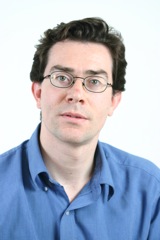Quantum Computing
Lecturer:
Dr. Ronald de Wolf
(CWI, Amsterdam).
About the lecturer | Course Summary | Slides | Assignment
 About the lecturer:
Dr. Ronald de Wolf received a PhD in Computer Science in 2001 from the University of Amsterdam and CWI (Dutch Center for Mathematics and Computer Science),
working on quantum computing advised by Profs. Harry Buhrman and Paul Vitanyi. He received the 2003 ERCIM award for his PhD thesis. After postdoc positions
at UC Berkeley and CWI, he now is a tenured senior researcher at the CWI in Amsterdam. His research includes complexity theory, codes, data structures,
and complexity theory, but focuses mostly on quantum computation, specifically quantum lower bounds, quantum communication complexity, and applications
of quantum techniques to questions in classical computing.
About the lecturer:
Dr. Ronald de Wolf received a PhD in Computer Science in 2001 from the University of Amsterdam and CWI (Dutch Center for Mathematics and Computer Science),
working on quantum computing advised by Profs. Harry Buhrman and Paul Vitanyi. He received the 2003 ERCIM award for his PhD thesis. After postdoc positions
at UC Berkeley and CWI, he now is a tenured senior researcher at the CWI in Amsterdam. His research includes complexity theory, codes, data structures,
and complexity theory, but focuses mostly on quantum computation, specifically quantum lower bounds, quantum communication complexity, and applications
of quantum techniques to questions in classical computing.
Course summary: The use of quantum mechanical effects to enhance computation was proposed by Deutsch and others in the 1980s, and gained momentum in the 1990s with the development of some spectacular quantum algorithms. The most notable of these is Shor's algorithm for factoring large integers, which - when physically realized - would break most of current cryptography. Since then, both the power and the limitations of quantum computers have been extensively studied. This course gives an introduction to the area, with emphasis on computer science aspects such as quantum algorithms and communication protocols. A rough outline is as follows:
- Lecture 1: introduction to quantum mechanics and quantum computation, some simple but illustrative quantum algorithms.
- Lecture 2: the main quantum algorithms, in particular Shor's factoring algorithm and Grover's search algorithm.
- Lecture 3: quantum information and communication, including communication complexity and cryptography.
- Tutorial: questions, exercises, etc.
- [PDF] due Feb 15, 2010. Please send your solutions in PDF to rdewolf AT cwi DOT nl.

